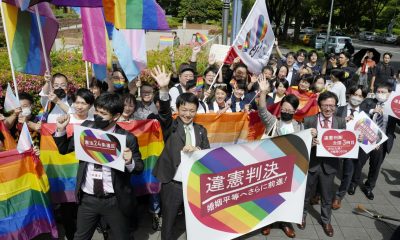Central America
Guatemala lawmakers scrap same-sex marriage ban bill
Country’s president said measure violated international treaties
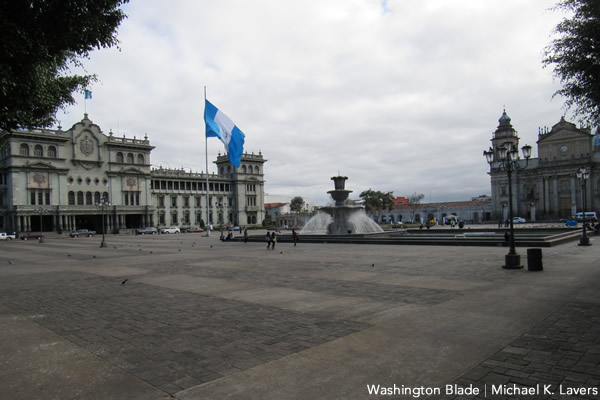
GUATEMALA CITY — Lawmakers in Guatemala on Tuesday tabled a bill that would have formally banned marriage for same-sex couples and defined a family as a man and a woman who are raising children together.
Agencia Presentes, a website that covers LGBTQ+-specific news throughout Latin America, noted members of the Guatemalan Congress voted 119-19 to table the “Law for the Protection of Life and the Family” bill. Agencia Presentes, which also reported 26 lawmakers abstained from the vote, posted a video that shows LGBTQ+ activists celebrating outside the Guatemalan Congress.
#Guatemala 🇬🇹 Momentos cuando el decreto 18-2022 fue archivado con 119 votos a favor de esta acción, 19 votos en contra y 26 votos ausentes. Así celebra las mujeres y la diversidad 🎊 con una resistencia de varios días en las calles. @redmmutrans @InfoOTRANS @ObservatorioLam pic.twitter.com/DW2iruXuev
— Agencia Presentes (@PresentesLGBT) March 15, 2022
Lawmakers in the Central American country on March 8 approved the bill under which a woman who has an abortion would have faced up to 10 years in prison.
The Inter-American Court of Human Rights in 2018 issued a landmark ruling that recognizes same-sex marriage and transgender rights in the Western Hemisphere. Guatemala is among the countries in which the decision is legally binding.
President Alejandro Giammattei sent the bill back to Congress for further review because he said it would have violated international treaties.
Honduras
Detienen a Romeo Vásquez por asesinato de Isy Obed: ¿cuándo pagará por Vicky Hernández?
Líder trans fue asesinada durante el golpe de estado de 2019
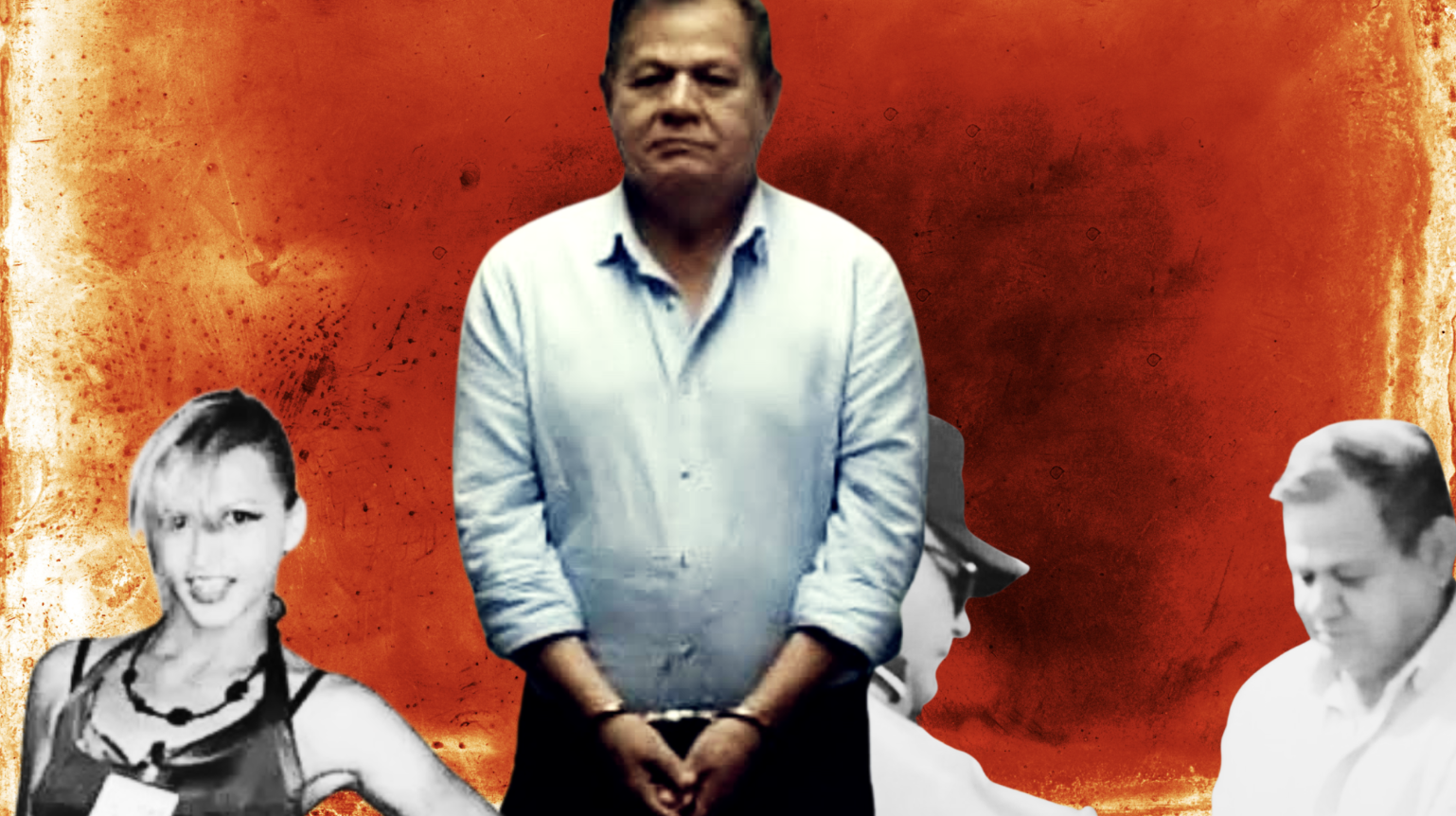
TEGUCIGALPA, Honduras — Casi 16 años después del asesinato de la líder trans Vicky Hernández, el general retirado Romeo Vásquez Velásquez fue capturado hoy como supuesto responsable de la muerte violenta de Isy Obed Murillo durante el golpe de Estado de 2009.
Tras el arresto, la opinión pública ha exigido justicia para Isy Murillo y la activista trans. Ambos fueron las primeras víctimas mortales del toque de queda encabezado por Vásquez Velásquez tras el golpe de Estado contra Manuel Zelaya Rosales en 2009.
La opinión pública se pregunta si de este modo se está allanando el camino para que los responsables paguen por el asesinato de Vicky Hernández e Isy Obed.
Junto con el general en retiro, las autoridades capturaron a otros jerarcas de las Fuerzas Armadas.
Estos arrestos, según el Ministerio Público, se deben a que estos militares comandaron y lideraron el operativo en que soldados abrieron fuego contra manifestantes opuestos al golpe de Estado, el 5 de julio de 2009.
Ese día, cientos de hondureños se aglomeraron cerca del aeropuerto Toncontín, en Tegucigalpa, para manifestarse y recibir al presidente Manuel Zelaya Rosales, quien iba a regresar en avión a Honduras.
Sin embargo, el ejército impidió la entrada de Zelaya en una acción en la cual mató de un balazo en la cabeza al joven Isy Obed Murillo.
«No solo incumplieron su deber de supervisar y controlar a sus subordinados, sino que, con pleno conocimiento de los hechos, permitieron y facilitaron estas atrocidades», dijo el MP en un comunicado.
A través de sus redes sociales, Romeo Vásquez respondió que la acusación en su contra es un intento del Gobierno de «callarlo a cualquier costo».
¿Pagará Romeo por el asesinato de Vicky?
Con la captura de Romeo Vásquez, el gobierno de Xiomara Castro parece haber dado un paso firme en busca de justicia para las víctimas del golpe de Estado de 2009.
Sin embargo, los arrestos de hoy han recibido también las críticas de grupos de la oposición y críticos de la administración de la presidenta Castro.
Por otro lado, la ciudadanía espera que no solo se haga justicia en el caso de Isy Obed Murillo, sino también en el de centenares de víctimas durante el mandato del general Romeo Vásquez bajo el gobierno de facto de Roberto Micheletti.
Por sobre todo, urge que las capturas de hoy abran la puerta para que las poblaciones LGBTQ+ victimizadas durante el golpe de Estado de hace 16 años reciban por fin una justicia largamente esperada.
Así, defensoras de los derechos de las diversidades esperan que las acciones de hoy sirvan para reivindicar a activistas como Vicky Hernández, asesinada entre el 28 y 29 de julio de 2009.
“¿Cuándo pagará Romeo Vásquez por el asesinato de Vicky Hernández?” es la pregunta que se hacen las organizaciones defensoras de derechos humanos de las poblaciones de la diversidad sexual en Honduras.
Según la sentencia de Vicky Hernández vs Honduras, la muerte de Vicky fue una ejecución extrajudicial cometida entre el 28 de junio y la madrugada del 29 de junio en San Pedro Sula, norte de Honduras.
El asesinato de la líder trans se dio en el marco del toque de queda y el golpe de Estado ejecutado por Roberto Micheletti contra Manuel “Mel” Zelaya a través del jefe de las Fuerzas Armadas, Romeo Vásquez Velásquez.
“Como representantes de las víctimas, exigimos justicia y no olvidar los asesinatos de personas LGBTI+ en el marco del golpe de Estado”, afirmó Indyra Mendoza de la Red Lésbica Cattrachas.
Asimismo, la Red Lésbica Cattrachas pidió al Ministerio Público que no olvide la sentencia de la Corte Interamericana de Derechos Humanos (Corte IDH) del caso “Vicky Hernández vs Honduras”, donde se especifica que el asesinato de la líder trans fue una ejecución extrajudicial.
En su sentencia, la Corte constató indicios de participación de agentes estatales en la violación del derecho a la vida de Vicky Hernández en un contexto de violencia anti-LGBTQ+.
El Estado reconoció en parte su responsabilidad internacional, ya que las autoridades no investigaron con diligencia el homicidio de Vicky. De hecho, según la Corte, las autoridades no consideraron el contexto de discriminación y violencia policial contra las personas LGBTQ+ y las mujeres trans trabajadoras sexuales.
Asimismo, el Tribunal determinó que, al haber sido asesinada y por el marco jurídico general de discriminación, se vulneraron los derechos a no discriminación y a la identidad de género de Vicky. A su vez, el Tribunal encontró que las familiares de Vicky Hernández resultaron afectadas por el sufrimiento que les causó su muerte, la permanente discriminación contra ella y la impunidad del homicidio.
En razón de estas violaciones, la Corte ordenó diversas medidas de reparación al Estado. Entre estas demandas está promover y continuar las investigaciones sobre el homicidio de Vicky Hernández.
Así reaccionan al arresto de Romeo
Minutos después de la captura del general retirado Romeo Vásquez para deducirle responsabilidades por la muerte violenta de Isy Obed Murillo, personalidades del ambiente político y social de Honduras salieron a dar declaraciones al respecto en medios y redes sociales.
El padre Ismael Moreno se halla entre quienes manifestaron su satisfacción por las capturas que hacen vislumbrar un rayo de esperanza a las familiares de las víctimas del golpe de 2009. En sus redes sociales, el padre Melo señaló que no es posible dejar “en el olvido” crímenes como el cometido contra Murillo.
“Que la justicia actúe con firmeza y conforme a debido proceso ante un militar que simboliza unas FF. AA. comprometidas con la impunidad. Ningún hecho de violación a derechos humanos y crímenes que vinculan al Estado contra inocentes prescriben ni pueden quedar en el olvido”, escribió Melo.
De manera parecida se expresó David Murillo, padre del joven asesinado en 2009. «No es persecución política, ¡él mató a mi hijo, él es el culpable!», afirmó el padre de Isy.
🚨 #ÚLTIMAHORA | 🗣️David Murillo: "No es persecución política, ¡él mató a mi hijo, él es el culpable!".
En #EXCLUSIVA, el padre de Isy Obed Murillo se pronuncia ante la captura de Romeo Vasquez Velázquez pic.twitter.com/Y1gX1j1iMP
— TSiHonduras (@TSiHonduras) January 5, 2025
Del mismo modo, el abogado Joaquín Mejía recomendó, por su parte, consultar el informe de la Comisión de la Verdad y la Reconciliación “que establece la responsabilidad de [Vásquez] en las graves violaciones a derechos humanos cometidas en el contexto del golpe de Estado”.
“Según la Comisión, la ‘responsabilidad del general […] está estrechamente ligada a la de Micheletti’”, publicó Mejía en sus redes. Además, afirmó que no debe olvidarse la responsabilidad del resto del Estado Mayor Conjunto.
Mientras tanto, la activista Berta Oliva ofreció un testimonio personal al recordar la manera como acompañó el dolor “de la madre y el padre de Isy Obed Murillo en su exilio en Argentina y en su romería interminable en Honduras”.
Para Oliva, la familia de Murillo ha recibido una “ofensa brutal” con “los años de silencio” alrededor del asesinato.
Entretanto, Gabriela Castellanos, del Consejo Hondureño Anticorrupción (CNA), volvió a mostrar por qué la consideran una de las críticas más duras del gobierno de Xiomara Castro.
“La persecución, la tortura y el asesinato de manera sistematizada de personas por motivos políticos en el marco del golpe de Estado en 2009, son hechos indiscutibles que hoy se disfrazan en nombre de la ‘justicia’”, aseguró Castellanos en X.
🗣️ Jorge Cálix: "Si se ha aplicado amnistía a otros como Rasel Tomé, el general puede solicitar ampararse en la misma ley". pic.twitter.com/JqjrIl36pw
— TSiHonduras (@TSiHonduras) January 5, 2025
Otro crítico de la acción de hoy del Ministerio Público, el analista político Olban Valladares, afirmó que la captura de Romeo Vásquez significa que el Ministerio Público “está cumpliendo instrucciones políticas de los que el pueblo ha identificado como los mandamases”.
Según Valladares, no es posible requerir a Vásquez porque “no se le ha probado ser ni el hechor material ni el intelectual” de la muerte violenta de Isy Murillo. Además criticó que Romeo “forma parte de un Estado Mayor Conjunto, una junta de comandantes, y se enfilan los cañones contra una sola persona”.
Entretanto, para el precandidato del Partido Liberal, Salvador Nasralla, medidas como el arresto del exjerarca militar Romeo Vásquez “sirven para asustar a la oposición”.
“En el caso de Romeo, lo que tienen que presentar son las pruebas por los que ellos creen que cometió”, agregó el presentador de televisión.
Declaraciones del Candidato Presidencial del Partido Liberal Salvador Nasralla sobre la persecución política que ha iniciado hoy 5 de enero 2025 el gobierno dictatorial de honduras. pic.twitter.com/sPKp49eXx0
— Salvador Nasralla (@SalvaPresidente) January 5, 2025
A las voces de la oposición que se alzaron contra la decisión del MP se unió el Partido Liberal, el cual declaró que está preocupado por la detención de Vásquez, “curiosamente avalada por funcionarios del Gobierno”.
Además, demandó al Ministerio Público que respete los derechos de Vásquez y pidió “no permitir por ningún motivo que se instale en nuestro país una nueva Venezuela”.
El Partido Nacional, por su parte, exigió «justicia plena, imparcial» y no usar las instituciones para vengarse.
La esposa de Romeo Vásquez, Lisbeth Zelaya, declaró que hace días habían amenazado a su esposo con encarcelarlo y que lo capturaron “sin pruebas”.
Para finalizar, las Fuerzas Armadas de Honduras se manifestaron la noche de hoy por medio de un comunicado sobre “la captura de tres exmiembros de esta institución”.
A continuación, la institución armada afirmó en el boletín que condena “todo golpe de Estado” y que rechaza “cualquier acción que implique la violación de los derechos humanos y las garantías constitucionales”.
Asimismo, las FF. AA. garantizó “que no habrá más golpes de Estado” y que “por ningún motivo las armas confiadas a nuestra institución serán utilizadas para afectar a nuestro pueblo”.
Central America
US Embassy in Panama condemns brutal attack of Trans woman
Estrella remains in coma at Panama City hospital

PANAMA CITY — The American, Canadian, Dutch, German and British embassies in Panama have condemned the brutal attack of a Transgender woman that has left her in a coma.
Panamanian media reports indicate Estrella, 27, suffered brain damage and lost 90 percent of her teeth when a man attacked her in Panama City on Aug. 16.
La Prensa, a Panamanian newspaper, on Aug. 18 reported Estrella remains in intensive care at a Panama City hospital and noted her lungs and kidneys are “not functioning.” The newspaper further noted the man who police have charged with the attack had his initial court appearance on Aug. 17.
Estrella’s mother, Aura Pinzón, told Panamá América, another Panamanian newspaper, her daughter moved to Panama City from David, a city in western Panama that is the capital of the country’s Chiriquí province, three months ago. Pinzón said doctors have told her they don’t expect Estrella to survive.
“We express our profound pain and our solidarity with Estrella, her loved ones and the trans community,” said the embassies in a statement they released on Tuesday. “Trans rights are human rights and all of them should all be protected, without exception. The love and sympathy that many Panamanians have showed for Estrella and their determination to put an end to hate and violence encourages us.”
The Office of the U.N. High Commissioner for Human Rights has also condemned the attack.
Panama does not ban discrimination based on gender identity. The State Department’s 2022 human rights report notes “societal discrimination based on sexual orientation and gender identity, which often led to denial of employment opportunities.”
“Civil society groups alleged continued police harassment of LGBTQI+ individuals as well as high levels of violence against Transgender persons,” notes the report. “Transgender activists alleged that a small number of police extorted transgender sex workers.”
Jessica Stern, the special U.S. envoy for the promotion of LGBTQ+ and intersex rights abroad, last September visited Panama.
First lady Jill Biden in May 2022 visited a Panama City shelter for people with HIV/AIDS. She announced the U.S. will provide an additional $80.9 million to fight the pandemic in Latin America.
Pope Francis visited the same shelter in 2019.
Central America
Panama urged to extend marriage rights to same-sex couples
Country’s Supreme Court earlier this year ruled against marriage equality
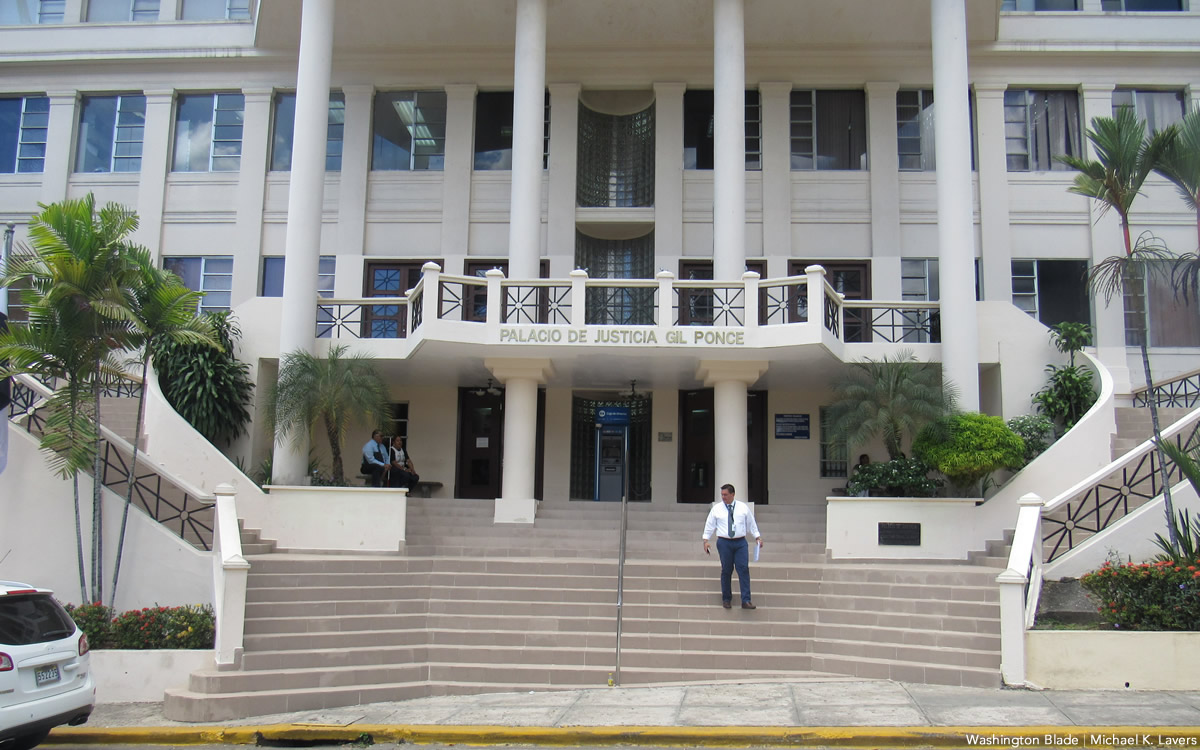
PANAMA CITY — The Inter-American Commission on Human Rights has urged Panama to extend marriage rights to same-sex couples.
The Panamanian Supreme Court in a March 1 press release noted six judges in February upheld the country’s prohibition of marriage for same-sex couples. The commission in a March 24 press release said the decision “has a negative impact on the principles of equality and non-discrimination by excluding the possibility of same-sex marriages and the recognition of those celebrated abroad.”
Enrique Jelenszky, a Panamanian citizen who married his husband, John Winstanley, in the U.K., in 2016 filed a lawsuit that sought recognition of their marriage. Álvaro Levy and his husband, Ken Gilberg, who is from the U.S., brought a second marriage equality lawsuit the same year.
Supreme Court Justice Luis Ramón Fábrega in 2017 heard arguments in the two cases that have been combined into one. Human Rights Watch notes three additional same-sex couples have brought marriage equality cases in Panama.
Neighboring Costa Rica and Colombia are among the jurisdictions in Latin America that have extended marriage rights to same-sex couples.
The Inter-American Court of Human Rights in 2018 published a landmark ruling that recognizes same-sex marriage and Transgender rights in the Western Hemisphere. Then-Panamanian Vice President Isabel de Saint Malo said her government would comply with the decision.
Former first lady Lorena Castillo is among those who have publicly backed marriage equality. Prominent religious leaders and officials in the current government remain vehemently opposed.
Iván Chanis Barahona, president of Fundación Iguales, a Panamanian advocacy group, this week told the Washington Blade the commission’s statement “was a very straightforward, categoric and clear reminder that Panama, as a member of the American Convention of Human Rights and as a member of the Inter-American Court of Human Rights, is obliged to secure marriage as the OC2417 (ruling) clearly established.”
“It is disappointing that Panama is not on that track, but it urged Panama to correct and amend this recent decision of the Supreme Court through all possible means, respecting our democratic values,” said Chanis.
“For me and for the work of Fundación Iguales and the work of civil society in Panama it’s very special support from our regional system of human rights to let us know that we are not alone and that we are on the right path of making Panama accountable as a sovereign state, part of the international community, to fulfill their human rights commitments,” he added. “This is a clear precedent that if Panama does not secure marriage and protections of LGBT people and couples in the coming year or years, Panama will lose at the Inter-American Court of Human Rights because the mandate is clear.”
Central America
Panamanian Supreme Court rules against marriage equality
Inter-American Court of Human Rights ruling applies to Central American country

PANAMA CITY — The Panamanian Supreme Court has upheld the country’s prohibition of marriage for same-sex couples.
A press release the Supreme Court issued on Wednesday notes six judges on Feb. 16 ruled the phrase “between a man and a woman” in Article 26 of Panama’s family code is not unconstitutional. The ruling also upholds a provision of a 2015 law that states “marriage between individuals of the same sex is prohibited.”
The press release notes the court concluded “the norms that provide that marriage should be voluntarily arranged between a man and a woman (who) are legally able to join to make and share a life together, and those that concomitantly prohibit people of the same sex from each other (Article 34, Number 1 of the family code and Article 35 of the Pan-American Code of Private International Law) are objectively and reasonably justified in the general interest of giving precedence to those unions with the potential of establishing families, giving continuity to the human race and, therefore, to society.”
“The ruling indicates that there is a reality, and that is, until now, the right to marriage equality is no more than an aspiration that, although legitimate for the groups involved, does not fall into a the category of a human right or a fundamental right, being that it lacks conventional and constitutional recognition,” notes the press release.
The court has yet to release the ruling itself.
Enrique Jelenszky, a Panamanian citizen who married his husband, John Winstanley, in the U.K., in 2016 filed a lawsuit that sought recognition of their marriage. Álvaro Levy and his husband, Ken Gilberg, who is from the U.S., brought a second marriage equality lawsuit the same year.
Supreme Court Justice Luis Ramón Fábrega in 2017 heard arguments in the two cases that have been combined into one. Human Rights Watch notes three additional same-sex couples have brought marriage equality cases in Panama.
Neighboring Costa Rica and Colombia are among the jurisdictions in Latin America that have extended marriage rights to same-sex couples.
The Inter-American Court of Human Rights in 2018 published a landmark ruling that recognizes same-sex marriage and transgender rights in the Western Hemisphere. Then-Panamanian Vice President Isabel de Saint Malo said her government would comply with the decision.
Former first lady Lorena Castillo is among those who have publicly backed marriage equality. Prominent religious leaders and officials in the current government remain vehemently opposed.
“This is clearly a ruling that has the intention to not only deny our human rights, but it is an activist-type of ruling if you think about it,” Iván Chanis Barahona, president of Fundación Iguales, a Panamanian advocacy group, told the Washington Blade on Wednesday during a WhatsApp interview.
Chanis said it is too soon to discuss a potential post-ruling strategy, but he did note Panama continues to violate the Inter-American Court of Human Rights ruling because same-sex couples cannot legally marry in the country.
“Technically Panama violated international law, violated international human rights law, violated the Inter-American system ruling,” said Chanis.
Central America
Trans woman deported from U.S. murdered in Honduras
Melissa Núñez had lived in Miami
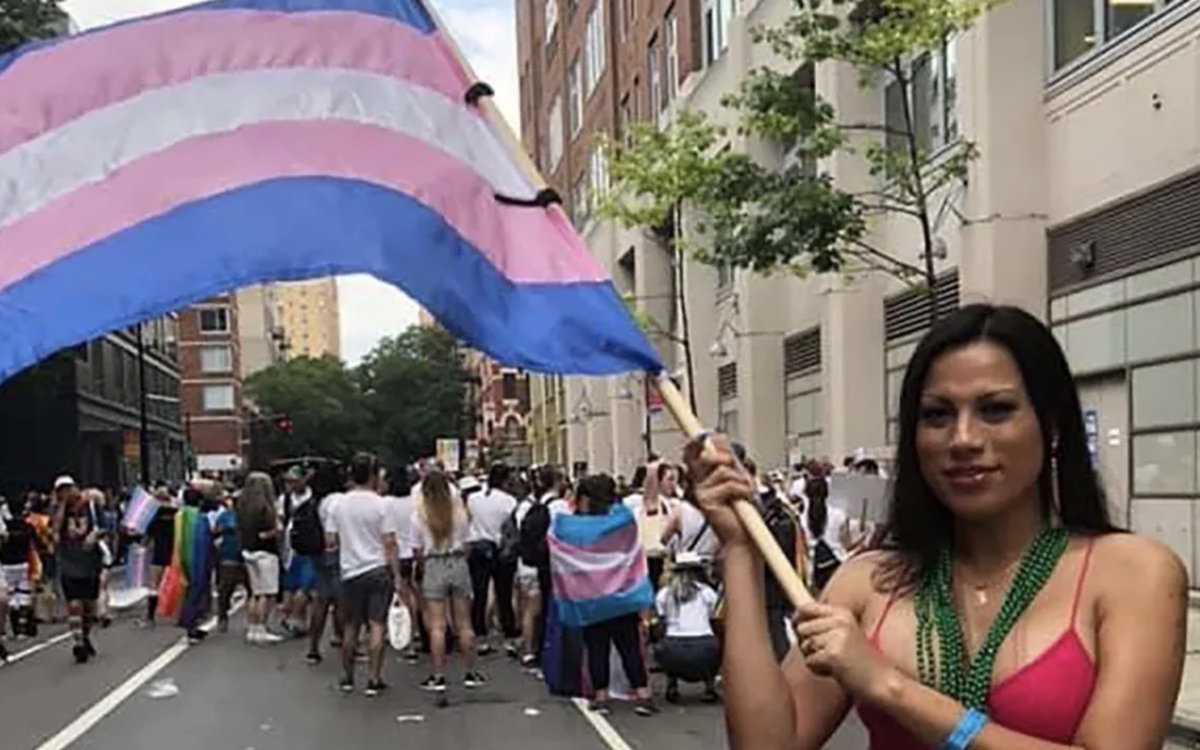
MOROCELÍ, Honduras — A Transgender woman who the U.S. deported to Honduras earlier this year has been murdered.
Reportar sin Miedo, the Washington Blade’s media partner in Honduras, reported a group of “hooded subjects” shot Melissa Núñez in Morocelí, a municipality in El Paraíso department in eastern Honduras, on Tuesday night.
Initial reports indicate Núñez, 42, died from a gunshot wound to the head.
Indyra Mendoza, general coordinator of Cattrachas, a lesbian feminist network based in the Honduran capital of Tegucigalpa, on Thursday confirmed to the Blade that Núñez asked for asylum in the U.S.
Mendoza said she did not know on what grounds Núñez asked for asylum, but Reportar sin Miedo reported she had lived in Miami and had more than 20,000 followers on TikTok. Núñez, according to Reportar sin Miedo, became “a strong activist” for LGBTQ+ and intersex rights while in the U.S.
Mendoza told the Blade that Núñez in December 2021 returned to Honduras after she traveled through Mexico and Guatemala. Núñez tried to return to the U.S., but Mendoza said American authorities deported her back to Honduras in July.
The Inter-American Court of Human Rights last June issued a landmark ruling that found Honduras responsible for the murder of Vicky Hernández, a Trans sex worker with HIV who died in police custody hours after the 2009 coup that ousted then-President Manuel Zelaya from power.
Zelaya’s wife, President Xiomara Castro, is among the Honduran officials who participated in a ceremony earlier this year during which the government publicly acknowledged it was responsible for Hernández’s murder. The admission the government reached with her family.
Violence and discrimination based on gender identity and expression nevertheless remains commonplace in Honduras. Vice President Kamala Harris is among the U.S. officials who have acknowledged anti-LGBTQ+ and anti-intersex violence are among the factors that prompt Hondurans and people from neighboring El Salvador and Honduras to leave their countries.
Camila Díaz Córdova, a Trans woman from El Salvador who the U.S. deported, was killed in San Salvador, the Salvadoran capital, in January 2019. A Salvadoran court convicted three police officers of Díaz’s murder and sentenced them to 20 years in prison.
Central America
Honduras government admits responsibility for Trans woman’s murder
Vicky Hernández killed in San Pedro Sula shortly after 2009 coup

SAN PEDRO SULA, Honduras — The government of Honduras on Monday publicly acknowledged it is responsible for the 2009 murder of a Transgender activist.
Vicky Hernández was a Trans activist and sex worker with HIV who worked with Colectivo Unidad Color Rosa, an advocacy group that is based in San Pedro Sula, the country’s second largest city.
Hernández’s body was found in a San Pedro Sula street on June 29, 2009, hours after the coup that ousted then-President Manuel Zelaya from power. Hernández and two other Trans women the night before ran away from police officers who tried to arrest them because they were violating a curfew.
The Inter-American Court of Human Rights last June issued a landmark ruling that found Honduras responsible for Hernández’s murder. The admission was part of the settlement.
Solicitor General Manuel Antonio Díaz Galeas and Foreign Minister Eduardo Enrique Reina García were among those who attended Monday’s ceremony that took place in front of Colectivo Unidad Color Rosa’s offices. President Xiomara Castro, who took office in January, participated virtually.
Kerry Kennedy, president of Robert F. Kennedy Human Rights, which represented Hernández’s family alongside Cattrachas, a lesbian feminist human rights group that is based in the Honduran capital of Tegucigalpa, also attended alongside Hernández’s mother, Rosa Hernández.
“We should love our children for who they are because they come from the womb,” said Rosa Hernández. “No one has a right to take a life.”
Kennedy noted the Honduran government “has taken the first steps by publicly acknowledging and taking responsibility and apologizing for murdering Vicky.”
Dona Rosa, you are such a beautiful soul. Thank you for trusting us with the fight for justice for your daughter. #JusticiaParaVicky pic.twitter.com/P44ANwbtNV
— Kerry Kennedy (@KerryKennedyRFK) May 9, 2022
Violence and discrimination based on gender identity and sexual orientation remains pervasive in Honduras.
Thalía Rodríguez, a prominent Trans activist, was killed outside her Tegucigalpa home on Jan. 11. Cattrachas notes she and Hernández are two of the more than 400 LGBTQ+ people who have been killed in the Central American country since 2009.
The Inter-American Court of Human Rights ordered Honduras to pay reparations to Hernández’s family and enact laws that protect LGBTQ+ people from violence and discrimination. Kennedy in her statement noted Castro has pledged “to making these necessary reforms.”
Central America
LGBTQ+ activist in El Salvador receives death threats
Erick Iván Ortiz lost Legislative Assembly race in 2021
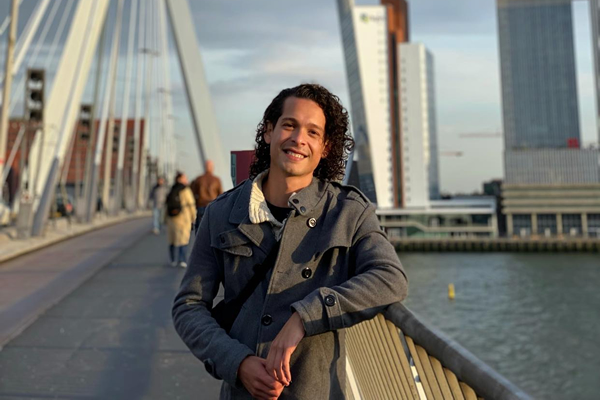
SAN SALVADOR, El Salvador — An LGBTQ+ rights activist in El Salvador who once ran for a seat in the country’s Legislative Assembly has received death threats.
Erick Iván Ortiz — a member of the Nuestro Partido party who is the director of communications for the Salvadoran Federation of Lesbian, Gay, Bisexual, Transgender and Intersex Persons — spoke about the threats during an April 20 press conference.
Ortiz said he received two phone calls on April 13.
The person who Ortiz said threatened him asked in the second phone call where “should we leave the body” and whether “we should bury it or dump it in the river.” The Salvadoran Federation of Lesbian, Gay, Bisexual, Transgender and Intersex Persons and the Nuestro Partido’s leadership have both condemned the threats.
Ortiz would have been the first openly gay person elected to the Legislative Assembly if he had won his race last year. Ortiz in January joined the Global Equality Caucus, a network of elected officials around the world who fight for LGBTQ+ rights.
Editor’s note: The Los Angeles Blade on Monday published a Spanish version of this article.
Central America
Guatemala lawmakers pass bill to ban marriage equality
Measure also defines family as a man and woman with children

GUATEMALA CITY — Lawmakers in Guatemala on Tuesday approved a bill that would formally ban same-sex marriage and define a family as a man and a woman who are raising children together.
The Guatemalan Congress by a 101-8 vote margin approved the “Law for the Protection of Life and the Family” under which a woman who has an abortion would face up to 10 years in prison. Media reports indicate 51 lawmakers did not attend the vote, which took place on International Women’s Day.
Visibles, a Guatemala City-based LGBTQ+ rights group, described the bill as “a law that promotes hate, violence, disqualification and dehumanization of those who dare to demand a more free and just world.”
“It is a regressive law that criminalizes girls, women and the LGBTIQ community through the exercise of their rights and freedoms,” said Visibles in a tweet.
El Decreto 18-2022 es una ley que promueve el odio, la violencia, la descalificación y la deshumanización de quienes se atreven a exigir un mundo más libre y justo. #NoALa5272 #NoALaLeyDelOdio pic.twitter.com/3V23SV0ZEs
— Visibles (@visibles_gt) March 9, 2022
“I never see marriage equality in Guatemala,” former Visibles Executive Director Daniel Villatoro told the Washington Blade on Friday.
Villatoro is currently a human rights fellow at Columbia University and the coordinator of the International Women’s Media Foundation’s LGBTQI+ and Women’s Rights Reporting Initiative in Latin America. Villatoro noted the bill would also codify the government’s official position that sexual education in the country’s schools should not promote “any sexuality that is not heterosexuality.”
“It is something broader,” Villatoro told the Blade. “It is a very heavy pathologization. It is anti-LGBT.”
The Inter-American Court of Human Rights in 2018 issued a landmark ruling that recognizes same-sex marriage and transgender rights in the Western Hemisphere. Guatemala is among the countries in which the decision is legally binding.
Media reports indicate President Alejandro Giammattei has said he would veto the bill because it violates international treaties. Villatoro noted Giammattei plans to send the measure back to Congress for further review.
“The law from its inception is unconstitutional,” said Congressman Aldo Dávila, who is openly gay and living with HIV, on Thursday in a video he posted to social media.
Central America
A dispatch from Honduras
U.S. seeking former president’s extradition on drug charges
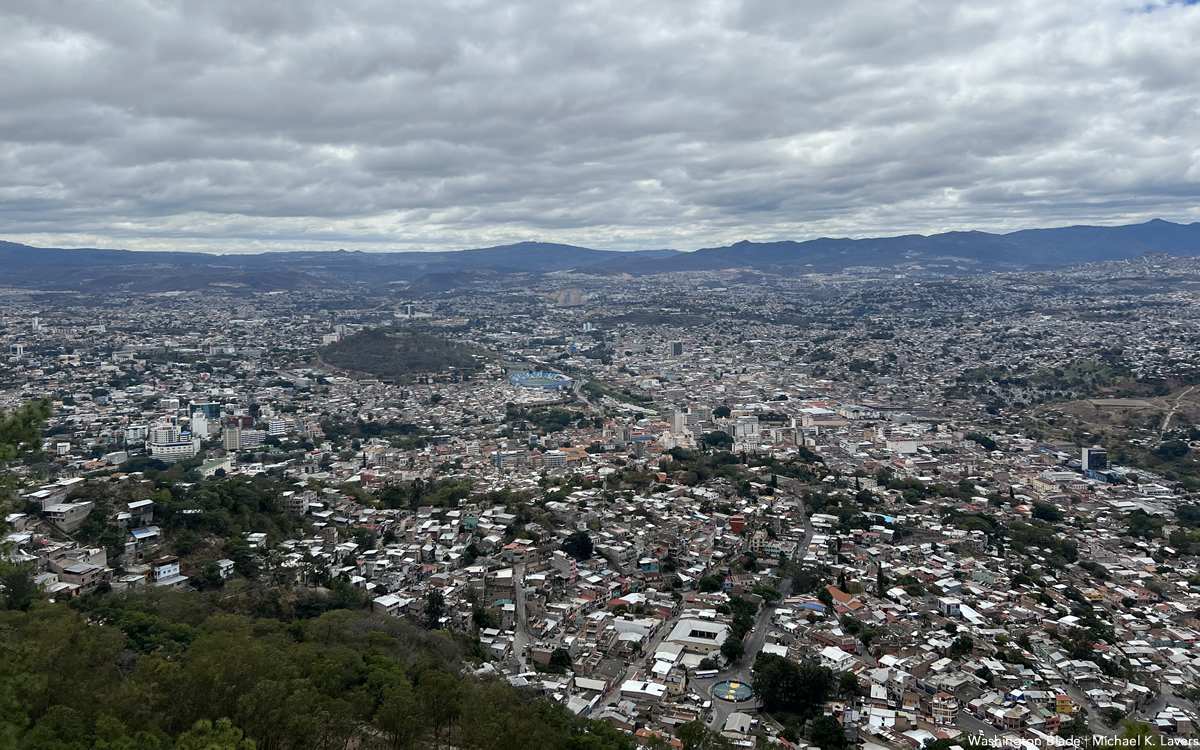
TEGUCIGALPA, Honduras — I was once again on assignment for the Washington Blade in Honduras from Feb. 6-11. I interviewed Víctor Grajeda, the first openly gay man elected to the Honduran Congress, and met Indyra Mendoza, founder of Cattrachas, a lesbian human rights group, at her office in Tegucigalpa, the country’s capital and largest city. I visited Dunia Orellana and Amílcar Cárcamo of Reportar sin Miedo, the Blade’s media partner in Honduras. I also had more than my share of “granitas de café,” or “iced coffees,” while in the country.
Honduras is one of the most violent and corrupt countries in the Americas.
The situation on the ground last July when I was on assignment in San Pedro Sula, the country’s second largest city, and in the cities of Tela and La Ceiba on Honduras’ Caribbean coast, was tense.
The trip took place against the backdrop of growing concerns over what would happen if the results of the presidential election that was scheduled to take place less than five months later were disputed. A pandemic-related curfew that was in place also added to this sense of uneasiness.
The situation on the ground on this most recent trip to Honduras felt slightly different.
President Xiomara Castro, a member of the leftist Free Party whose husband, former President Manuel Zelaya was removed from office in a 2009 coup, took office on Jan. 27.
Castro defeated Nasry Asfura, a member of now former President Juan Orlando Hernández’s National Party who is Tegucigalpa’s former mayor, in the presidential election’s first round that took place last Nov. 28. Vice President Kamala Harris and U.S. Agency for International Development Administrator Samantha Power are among the foreign dignitaries who attended Castro’s inauguration that took place at Honduras’ national stadium in Tegucigalpa. Grajeda and our Reportar sin Miedo colleagues were also on hand to witness the moment when Honduras’ first female president took office.
“I was there for this historic moment,” said Erick Martínez, a long-time activist who ran for Congress in 2017, during an interview in San Pedro Sula on Feb. 8. “I was crying in this full stadium; crying with pride; with joy; with sadness for the people who were not there.”
Martínez specifically mentioned Walter Tróchez and Erick Martínez Ávila, two Honduran LGBTQ activists who were murdered in December 2009 and May 2012 respectively. The Inter-American Court of Human Rights in a landmark ruling it issued last June said the Honduran state was responsible for the murder of Vicky Hernández, a transgender activist who was killed in San Pedro Sula hours after the 2009 coup.

Juan Orlando Hernández was president of Congress from January 2010 to June 2013. He became the country’s head of state in 2014.
The Supreme Electoral Tribunal declared Hernández the winner of the 2017 presidential election, despite widespread irregularities and criticism that his decision to run for a second term violated the Honduran constitution. The disputed election results sparked widespread protests across the country that left dozens of people dead.
Juan Orlando Hernández did not attend Castro’s inauguration.
I was driving to interview Grajeda in San Pedro Sula when I read a press release from Secretary of State Antony Blinken that announced the U.S. had sanctioned Juan Orlando Hernández for corruption.
Honduran authorities on Feb. 15 arrested Juan Orlando Hernández at his Tegucigalpa home after the U.S. asked for his extradition on drug and weapons charges. Federal prosecutors allege Juan Orlando Hernández used drug trafficking to fund his political campaigns.
Juan Orlando Hernández’s brother, former Congressman Juan Antonio “Tony” Hernández, is serving a life sentence in the U.S. after a federal jury convicted him of trafficking tons of cocaine into the country. I was driving from San Pedro Sula to Tegucigalpa on Feb. 8 when I heard on the radio that a federal judge in New York had sentenced Geovanny Fuentes Ramírez, a drug trafficker who allegedly bribed Juan Orlando Hernández and other Honduran government officials, to life in prison.
Honduras was certainly a “narco state” when Juan Orlando Hernández was president.
Castro, for her part, has publicly supported marriage equality and backs legal recognition of trans Hondurans and what Grajeda described as “safe spaces” for LGBTQ people.
Six gay men and a trans man have been reported killed in Honduras since Castro took office. Police continue to face criticism over the investigation into the Jan. 11 murder of Thalía Rodríguez, a prominent trans activist who was shot in front of her Tegucigalpa home. Jerlín, a trans man who I interviewed last July in La Ceiba, fled the country weeks before Castro took office and plans to ask for asylum in the U.S.
None of the sources with whom I spoke in Honduras are naive to the many challenges that Castro and her government face. They are also waiting to see whether the new government in Tegucigalpa will have a tangible impact on the lives of LGBTQ Hondurans who continue to face rampant violence and discrimination.
We shall see.
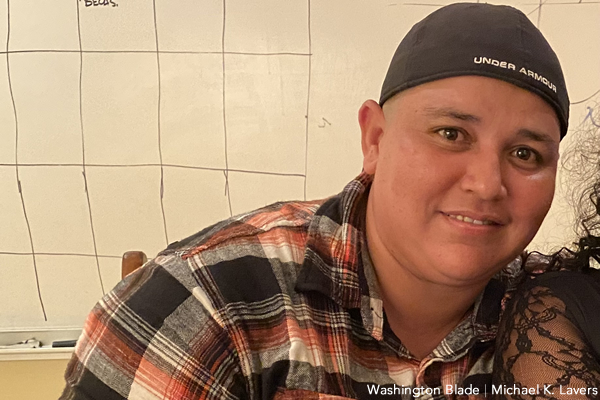
EAGLE PASS, Texas — A Transgender man who fled Honduras has been able to enter the U.S.
Jerlín, who the Washington Blade interviewed last summer in the Honduran city of La Ceiba, on Saturday entered the U.S. in Eagle Pass, Texas, after U.S. Citizenship and Immigration Services granted his request for humanitarian parole that allows him to temporarily remain in the U.S.
Jerlín told the Blade in a previous interview that he and a small group of migrants left Honduras on Jan. 14.
He reached Piedras Negras, a Mexican border city that is across the Rio Grande from Eagle Pass on Jan. 24. Jerlín sought to enter the U.S., but U.S. Customs and Border Protection officers sent him back to Mexico under Title 42, a Center for Disease Control and Prevention rule that has closed the Southern border to most asylum seekers and migrants because of the pandemic.
Jerlín’s lawyer, Abdiel Echevarría-Caban, submitted the humanitarian parole application on his behalf.
Echevarría-Caban told the Blade that Jerlín plans to ask for asylum in the U.S. based on persecution due to his gender identity. Jerlín, whose legal name does not correspond with his gender identity, will pursue his case from Houston where his mother and sister live.
Violence and discrimination based on gender identity remains commonplace in Honduras.
Thalía Rodríguez, a prominent Trans activist, was murdered outside her home in Tegucigalpa, the country’s capital, on Jan. 11.
The Inter-American Court of Human Rights last June issued a landmark ruling that found the Honduran state responsible for the murder of Vicky Hernández, a Trans activist who was killed in San Pedro Sula, the country’s second largest city, after the 2009 coup that ousted then-President Manuel Zelaya. (His wife, Xiomara Castro, took office as Honduras’ first female president on Jan. 26.) Cattrachas, a lesbian feminist human rights group in Tegucigalpa, notes Hernández and Rodríguez are two of the more than 400 LGBTQ+ people who have been reported killed in Honduras since 2009.
-

 Arts & Entertainment4 days ago
Arts & Entertainment4 days agoA Night of legacy, love, and liberation: Inside the 2025 April Fool’s Ball
-

 Movies4 days ago
Movies4 days agoHeartfelt ‘Wedding Banquet’ remake a romcom worth seeing
-

 Arts & Entertainment4 days ago
Arts & Entertainment4 days agoSouth Coast Repertory Theatre hosting world premiere production
-

 Brazil3 days ago
Brazil3 days agoUS lists transgender Brazilian congresswoman’s gender as ‘male’ on visa
-

 opinions2 days ago
opinions2 days agoOver 36,000 Angelenos unite for ‘Fighting the Oligarchy’ rally
-

 Books2 days ago
Books2 days ago‘Pronoun Trouble’ reminds us that punctuation matters
-

 Congress3 days ago
Congress3 days agoEXCLUSIVE: Garcia demands answers on deportation of gay Venezuelan asylum seeker
-

 Theater2 days ago
Theater2 days ago‘The Broadway Cage Match’ ready to rumble at WeHo’s Musical Mondays
-

 Features2 days ago
Features2 days agoNew mayor Chelsea Byers, hopes to make WeHo a model city for others to follow

